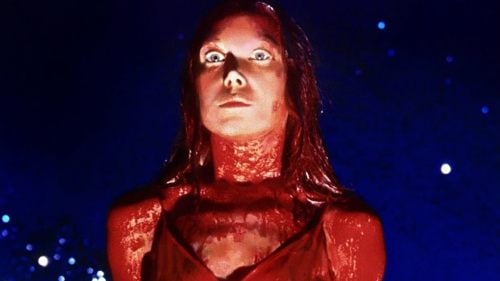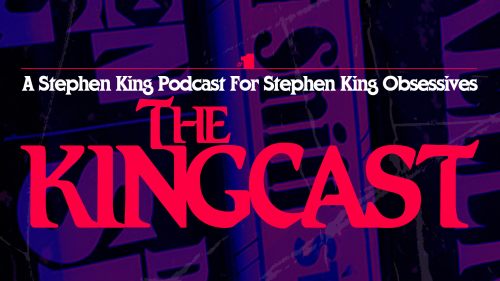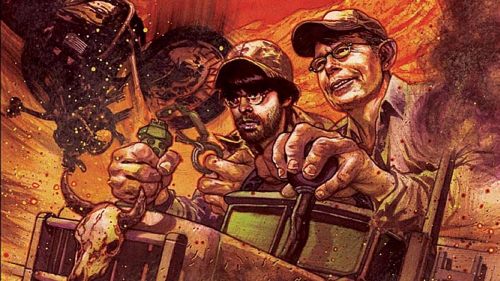Book Review: THE DEAD ZONE, A Novel Of The Tea Party
Stephen King’s 11/22/63 was a massive disappointment for me, but it contained just enough elements of the old King - ie, before half his characters thought in rhyming couplets or radio station jingles - that it made me interested in revisiting some of the classic King books that I loved so much as a younger reader. Would these books hold up, or was I wrong and would the excesses and lackadaisical plotting be prominent right from the start?
Rather than just jumping into the King books in order I decided to revisit only the Castle Rock stories. One of the things that got on my nerves in later King books - and that pops up in 11/22/63 - is his reliance on the shared universe he’s created. What began as a cool nod to Constant Reader turned into a weird DC Comics type continuity; beyond that it undermined the feeling of ‘normal small town with strange events.’ After all, how many crazy things could happen in Castle Rock alone? King went so far as essentially wipe Castle Rock off the map in Needful Things, and I’m fascinated by how he reached such a level of self-reflecting writing that he needed to have a ‘final’ Castle Rock story.
I don’t want to say that this will be a recurring feature; I’m not great at them, and I’ll just let you down. And my speed of reading these books is slow - it took me a month to get through The Dead Zone, mostly because I read it while on planes. But I liked reading through The Dead Zone, and I’m going to continue on to Cujo. My own personal definition of Castle Rock stories is pretty narrow, so something like Pet Sematary, which references Castle Rock but isn’t set there, won’t be on my reading list. Unless I really get a hair up my ass to read that - again, this isn’t a set in stone series, just a way of revisiting old Stephen King books.
The Dead Zone is almost a great book. Strangely enough if it had some of the excesses of later King - especially in terms of page count - it might have reached that greatness. What it actually is, though, is a strong bit of storytelling. King isn’t wrapped up in his prose, which is workmanlike and straightforward, and he isn’t spending lots of time creating thematic echoes or working with subtext. The Dead Zone is a yarn, first and foremost.
The book can be really broken down into four main sections, with the first being the life of Johnny Smith before he has an accident that leaves him in a five year long coma, what happens to Johnny from the time he awakens from the coma to his solving the case of the Castle Rock Strangler, his brief stint as a tutor whose prophetic vision saves some teenagers from a fire, and his final phase as a lone assassin looking to take out a politician whose future includes starting World War III.
Taken that way, the book is almost a series of diminishing returns; the strongest stuff is right up front as King really draws from his own life as a Maine schoolteacher to create a world that is familiar and true. Johnny Smith is right on the verge of being a Mary Sue - he has almost no negative traits, except maybe for being too nice. But Smith is made more tolerable by the accident, which takes him out of his life and then slightly cripples him.
Stephen King books always read like first drafts, and The Dead Zone is no different. Before the accident Johnny has a new girlfriend, Sarah, and a life; when he wakes up he’s five years older, she’s married with a child, and the world has moved on in big ways for him. King makes a lot out of the changes in the world, but in the end they’re just window dressing; none of this pays off in any major way. That’s the first draft effect, where it seems like King has an idea for this coma, but then doesn’t quite get around to it. If he had gone back for another draft he might have remembered to pick up that thread, or to get rid of it altogether, but as it stands now it’s an interesting dead end.
The one thing that the coma does it makes Johnny forever a loner, feeling like the best years of his life were stolen from him. It keeps Sarah out of his reach. But in the later half of the book King skips ahead anyway, leaving us years of Johnny’s life to guess at. And while he has Sarah show up to sleep with Johnny one time, she’s never a major figure in the book again. It’s weird because Sarah has married a politician, and Johnny ends up a political assassin - surely there’s some drama to be gained from this? Even if King didn’t want to have Sarah’s husband be the target, he might have had Johnny be forced to use Sarah to get close to the guy he’s trying to kill.
But whatever; while the story slowly peters out it still ends on a conceptual strong note, with Johnny failing to kill his target - leaving him short of a murderer - but disgracing him nonetheless, ending his career. It’s a little bit of a Twilight Zone ending, but the book isn’t so long that it feels like a cheat.
The first draft aspect extends to Johnny’s target, Greg Stillson. There are early chapters which follow Stillson’s career as he moves from a Bible salesman to a real estate scammer to a politician, but they don’t quite mirror Johnny’s. There are some aspects that do mirror Johnny’s path, mostly in that Stillson feels like the lord is moving him into place while Johnny is fighting against what might be a mission from God to stop Stillson, but King sort of half-asses it. In a larger book he might have given Stillson more screentime, letting his story breathe. Instead we jump into Stillson’s stories at random points; if those chapters were excised I think the book would read essentially the same.
I would have liked more Stillson because he’s the character who ended up fascinating me the most this readthrough. When The Dead Zone came out Stillson probably felt like a bit of a broad character, but today he feels all too real. The movie version of The Dead Zone (which, by the way, fixed the problem with Sarah by having her involved in the finale) cast Martin Sheen as a version of Stillson who was much more like the Moral Majority of the 80s, but King’s character is prescient: Greg Stillson is completely a Tea Party candidate.
A not terribly bright guy with clownish views (he wants to send all pollution into space), Stillson has a shady past but a strong belief in God. He’s a Washington outsider whose whole campaign is about kicking those bums out and holding politicians accountable. Except for the fact that Stillson’s base is wide - students and union types support him, as well as traditional conservatives - he could be any Tea Party candidate today.
Of course King wasn’t totally pulling a Johnny Smith here; there have always been lowbrow populist candidates who made an impact. I’m sure Andy Griffith in A Face in the Crowd greatly impacted King’s vision of Stillson. But there’s something very specifically Tea Party about Stillson, and it’s really the buffoonish nature of his campaign that somehow succeeds and sends him to the highest levels of government. We’re in the middle of an election cycle where all of the GOP candidates are pulling their best Greg Stillsons - showing little to no knowledge of foreign policy, having inane campaign pledges they cannot possibly fulfill, being national laughingstocks yet somehow staying in the game. Reading The Dead Zone while watching the GOP debates may have been the scariest way to experience the book.
The strangest thing about The Dead Zone is that King really half-asses the excellent conclusion. The narrative is dedicated to making Johnny Smith completely trust his powers so that he has no question about the veracity of his visions. That bit of drama removed - Johnny is utterly sure of himself - the novel mostly skips over the moral question - a question King revisits in 11/22/63*. If you could go back in time and kill Hitler before he became ‘Hitler,’ would you? And would it be the right thing to do?
That actual question is asked in The Dead Zone, but there’s no drama to the quandary. In fact, King sets most of the chapters leading up to the assassination outside of Johnny’s POV, narrating from the perspective of people who come into contact with Johnny - suffering from a brain tumor - as he goes about his preparations.
Again, this is where more pages could have added to the book’s quality. Spending more time with Johnny as he goes back and forth - and not forcing his hand with a terminal tumor, as well - could have made for some delicious moral agonizing. I would have liked to have seen Johnny try other ways to derail Stillson before coming to assassination; in fact the Final Destination-esque aspects of 11/22/63 would have played well here, as Johnny essentially duels with fate.
I know there’s nitpicking here, but it’s because The Dead Zone is a few drafts away from real greatness. As it stands it’s a well told story, one that epitomizes my belief that Stephen King is a classic storyteller but not a particularly great writer. He tells this tale well, even if he leaves you wanting something more from the finale. And maybe part of what makes that tale work is the economy of it; perhaps if King had spent more pages on these characters The Dead Zone would have gone from a good story that leaves you wanting more to the kinds of bloated messes he would soon exclusively write.
* he has said that he had the idea for 11/22/63 after writing Carrie, and it seems like he covered that ground in this novel.



